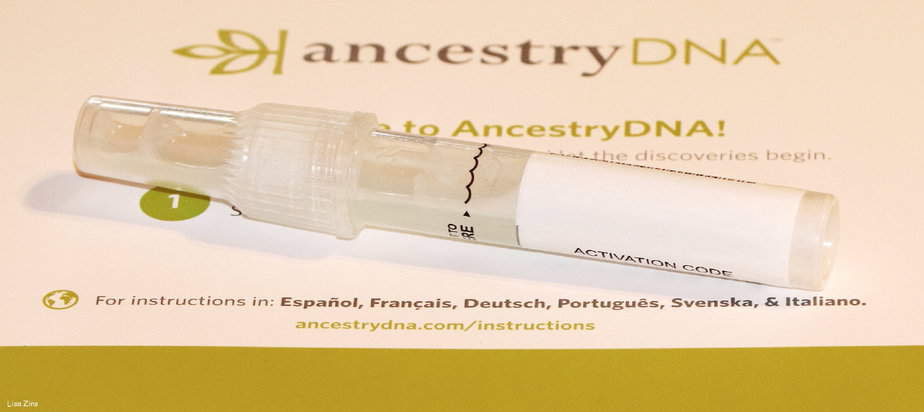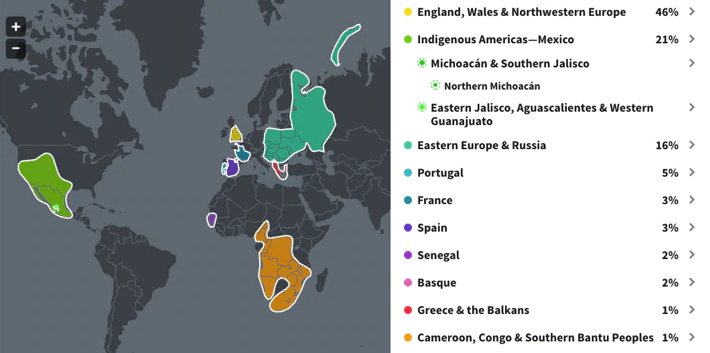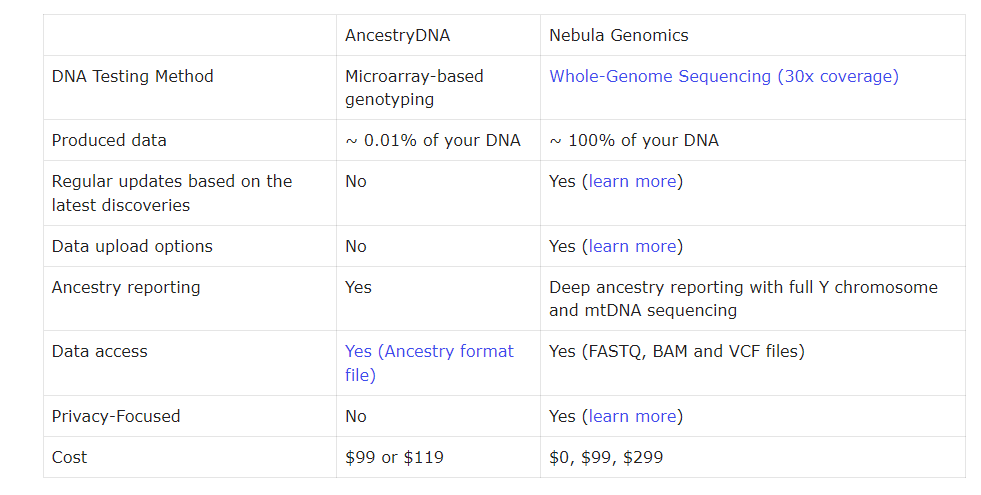Ancestry Review Summary

Ancestry is a leading consumer genetic testing company that has provided its DNA testing services to 16 million people. Read more in our Ancestry review!
7 Facts from our Ancestry Review
Location: Lehi, Utah, United States
Products: DNA-based genetic genealogy and health test
Reporting: Estimates ethnicity and finds close and distant relatives
Data download: available in Ancestry data format
Privacy: Users have control over data sharing and public availability. You can delete Personal Information from Ancestry records any time you want
Costs: $99 for an ancestry DNA test. The company also has regular deals and sales, which can save up to 50%. A free trial is available for 14 days, but the customer must cancel at least 2 days before the end of the trial, or else they will be charged the full amount of chosen membership price on expiration of the trial
Alternatives: Nebula Genomics (Whole Genome Sequencing with regularly updated reports and advanced ancestry reporting)
This review is written with the intent to be as unbiased as possible. However, it represents the opinion of an individual reviewer and is therefore subjective. Furthermore, at Nebula Genomics we seek to educate the public about the benefits of Whole Genome Sequencing. Information about our Whole Genome Sequencing DNA test is therefore incorporated into the review.
June 27, 2022
Table of contents
7 Facts from our Ancestry Review
Pros and Cons

Pros
Cons
Ancestry Introduction
Review of Taking the Ancestry DNA Test
Review of Ancestry Products
Review of AncestryDNA ($99)
Review of AncestryDNA + Traits ($119)
Review of AncestryHealth ($149) – Discontinued
Review of Ancestry Privacy
Ancestry in the News
Other AncestryDNA Reviews
Nebula Genomics
Your privacy is central
Nebula Expand
Whole Genome Sequencing
Pros and Cons
Pros
Extensive genealogy exploration tools, including potential matches and family trees makers
Large user base, including over 3 million paying subscribers
Health and wellness testing options
Options to link to Ancestry.com’s historical records
Cons
Outdated genetic testing technology that leaves much of a user’s DNA unexplored
Privacy concerns when sharing information with DNA matches
Ancestry Introduction

Ancestry is a DNA testing service that began as a family history magazine and book publisher in 1983. Over a decade later, it launched Ancestry.com to collect genealogy data like military records and track family histories with historical documents.
In 2002, Ancestry partnered with Relative Genetics to offer direct-to-consumer DNA testing. Thus, becoming one of the first testing companies to enter the growing home DNA testing market.
By 2012, a DNA test, AncestryDNA, became the company’s flagship service – combining genetic and family history data. Today, it is the “global leader in family history and consumer genomics.” Over 20 million people have purchased AncestryDNA, and the company stores records from over 80 countries of origin.
Review of Taking the Ancestry DNA Test
The AncestryDNA test relies on analyzing DNA in your saliva. After using an email address to create an account and purchasing one of the Ancestry DNA kits online, the company sends a package that includes a saliva collection tube and a return label.
Users must then:
Activate the kit. This involves creating an account on the Ancestry website and using their Ancestry login to register the unique DNA kit activation code.
Fill the tube with their saliva. It’s important that you don’t eat, drink, smoke, or chew gum or tobacco for 30 minutes after brushing your teeth and before providing your saliva sample.
Send it back to Ancestry using the provided return package and shipping address.
The testing laboratory will analyze the saliva sample for genetic markers and process the autosomal DNA test results within 8 weeks of receiving it. The DNA results are then posted on the user’s account, with an email notifying users of that they are available. Once customers receive their results, they can download raw data and use it with other analysis sites and marketplaces such as GenePlaza and sequencing.com.
Review of Ancestry Products
Review of AncestryDNA ($99)
The AncestryDNA test kit is the company’s flagship test. The DNA science involves an autosomal testing service that samples 700,000 markers in the human genome to analyze a user’s genetic makeup and generate a DNA profile. This provides insight into the user’s ethnicity and information on where their ancestors lived.
The company also touts extensive ancestry family trees and historical records that can be linked to your AncestryDNA results. This includes a large DNA database of genetic matches and potential common ancestors linking your family together.
Genetic communities are groups of AncestryDNA members who are connected through their DNA. AncestryDNA uses its trademarked Genetic Communities technology to help customers connect with their past.
Ethnicity Estimate
A user’s genomic markers are assigned to origins in over 1,500 regions around the globe. These specific regions are determined by a reference population panel of over 40,000 DNA samples that compares your DNA to others. This panel divides the world into 60 regions, like the Middle East, in a similar format to a pie chart. Users can use this world explorer to better understand the origins of their family story and connections. origins in over 1,500
Each ethnicity estimate includes an approximate range. This gives users a better idea of how confident the company is that a person descended from a certain region. The results also include migration paths and patterns for the user’s ancestors.
AncestryDNA Matches
AncestryDNA matches users to identify relatives based on shared genomic regions. To see a match’s full family tree, users need a membership. Matches can include close family members like parents and siblings or as distant as fourth cousins.
Ancestry allows users to make the most out of their match results and helps individuals in their ancestry search.
First, by linking test results to a public family tree, you increase the chance of finding common ancestors and more matches. Users can also check shared matches, filling out the family’s sides each match is from.
Second, beyond looking for more family trees to explore, users can also communicate with their matches. This can provide more understanding of how each match is connected to their family tree.
A membership allows users to use their login to view family records on www.ancestry.com, including over 100 million family trees made by other Ancestry users. Membership is $24.99/month for access to U.S. records and $39.99/month to include international records.
AncestryDNA ThruLines
This feature enables users to see how they are related to their matches. The results are based on genetic information in family trees (paternal and maternal lines). Specifically, how much overlap your family tree might have with a match’s family tree (e.g., common great grandparents).
To access ThruLines on Ancestry, a user must:
Opt to see and be seen by their DNA matches. This allows matches to see your ethnicity estimates and shared genetic data.
Link your family tree to your Ancestry DNA test and ensure it is searchable.
Building a family tree back at least four generations.
Review of AncestryDNA + Traits ($119)
This additional service lets users learn how their raw DNA impacts various traits through personal trait reports. It focuses on markers related to health and wellness, like Omega-3 deficiency and male hair loss.
The information also includes less serious characteristics like earwax type and aversion to cilantro. Overall, this service lets you discover 35+ traits, allowing you to explore how your genes could influence a range of appearance, sensory, fitness, nutrient, and other personal characteristics—like endurance fitness, heart rate recovery, and more.
Review of AncestryHealth ($149) – Discontinued
The AncestryHealth test kit was launched in 2019. It included all of the above features of the AncestryDNA kit. Additionally, the health DNA testing kit included reporting to help customers identify potential health risks in their genes. For eligible participants, a physician would order relevant tests to assess their predisposition to specific health conditions. If suitable, health testing results included actionable health reports and access to genetic counseling resources.
However, Ancestry.com stopped support for AncestryHealth in July 2021. The company indicated that this decision was made in an effort to “deepen our focus on family history”.
Review of Ancestry Privacy
Ancestry sends DNA samples for lab processing to third-party labs in the United States. The only thing that tracks the user is a unique activation code. The user’s identity and DNA testing results are separated during the testing process. Results are stored in the company database, which uses various safeguards to prevent user information from being shared.
Once a user has received their results, they have a handful of options to share their data. Some basic options include displaying the user’s full name and allowing matches to access ethnicity results. According to the Terms and Conditions, the customer retains ownership over their data except when used in accordance with the privacy statement and terms of service.
Users can also share DNA results and download their raw DNA testing data. In addition, Ancestry allows users to delete DNA test results from the database, destroy user samples, and permanently delete Ancestry accounts.
A user can opt into the Ancestry Human Diversity Project. This project includes research done by Ancestry and as well as third-party researchers. If a user agrees to participate, Ancestry may share anonymized data as well as biological samples.
Ancestry in the News

Being an industry leader in the DNA testing space, Ancestry is constantly referenced in the news. This includes articles about a recent slowdown in the DNA testing market, as reported in outlets like CBS News and Vox.
Many articles about Ancestry also touch on privacy concerns. For example, articles in USA Today and the New York Times. Some sources have reported that Ancestry refused to provide customer information when asked for it by law enforcement due to an improperly served warrant. This measure could have given officers access to 16 million DNA profiles from Ancestry’s customers.
CEO Tim Sullivan has been interviewed by The Bottom Line, a Utah-based radio program.
On September 10, 2021, MyLondon News featured a story of a woman who tracked down her father after 35 years of not knowing anything about him. She paid £70 for an Ancestry test that, although she states was confusing at first, did help her find the region where her dad was living.
Ancestry.com was listed as one of the top players in the Ancestry Testing Market 2021 Global Regional Overview. This research study includes forecasts for up to 2026 and analyses of this business sector.
Other AncestryDNA Reviews
Generally, the company gets good ratings from customers online. Ancestry.com has a “Great” rating on Trustpilot, with a 4.9 out of 5-star average rating with over 8000 reviews.
On Amazon, Ancestry DNA reviews averages 4.7 out of 5 stars with almost 60,000 rankings, and the AncestryDNA + traits averages 4.7 stars out of 5 with over 12,000 rankings.
Overall, customers liked the information and services provided and had good experiences with customer service. Some noted that they had trouble with “cancel my membership” features.
Nebula Genomics
How does Ancestry compare to our services in Nebula Genomics? Let’s find out.
Your privacy is central
While learning about your genetic code can be invaluable, we address clear privacy risks at Nebula Genomics. In fact, we have built and continue to update the first privacy-focused personal genomics service. We eliminate the middlemen so that you can be compensated if you choose to share your data. You can read more about the importance of DNA privacy on our website.
Nebula Expand
You can upload raw DNA files from AncestryDNA to our site to discover more about your genome with our expanded report. We use statistical models called imputation to fill in the blanks in your AncestryDNA raw data. This enables extensive reports that contain hundreds of traits based on curated research studies.
Whole Genome Sequencing
With our 30x Whole-Genome Sequencing service, we can read 100% of your DNA. This is our way of empowering our customers to go beyond other testing technologies offered by services like Ancestry and 23andMe. Our DNA test generates 10,000 times more data than AncestryDNA, providing you with a complete picture of your DNA.
With our DNA tests, you will get access to the world’s largest Y-DNA and mtDNA (mitochondrial DNA testing) databases. This enables a full breakdown of the maternal and paternal line to power your genealogical research.
Here is how it compares with the AncestryDNA test kit:
If you are interested in ancestry and genealogy, you should also consider:
- 23andMe (basic ancestry test)
- 24Genetics (ancestry test)
- African Ancestry (African lineages)
- CRI Genetics (basic ancestry test)
- DNA Consultants (specific ethnicities)
- DNA Land (free DNA upload for trait and ancestry analysis)
- DNA Painter (first profile is free and subscriptions are available for others)
- Findmypast (genealogy for those with British and Irish ancestry)
- GedMatch Genesis (free DNA upload for genetic genealogy and paid advanced options)
- Genovate (relationship, health, fitness, and ancestry tests)
- HomeDNA Ancestry (migration history based on gene pools)
- iGenea (percentages origins, relatives, ancient tribes, and famous people)
- Living DNA (UK based ancestry test)
- MyHeritage (ancestry test, additional subscriptions for access to genealogy tools)
- TheGenealogist (UK based genealogy service)
- If you’re looking for an at home paternity test, you should also read our review of HomeDNA.
If you want to focus on your maternal and/or paternal lineages, you can look at YFull or YSeq, services which analyze mtDNA or the Y chromosome to determine specific lineage haplotypes. Full Genomes also offers Y chromosome sequencing and analysis.
Did you like our Ancestry review? You can read more reviews on our blog and check out our complete guide to the best DNA test kit and other home tests.
Want to dive deeper into ancestry analysis? Check out our GEDmatch tutorial to learn how to use this powerful tool!

